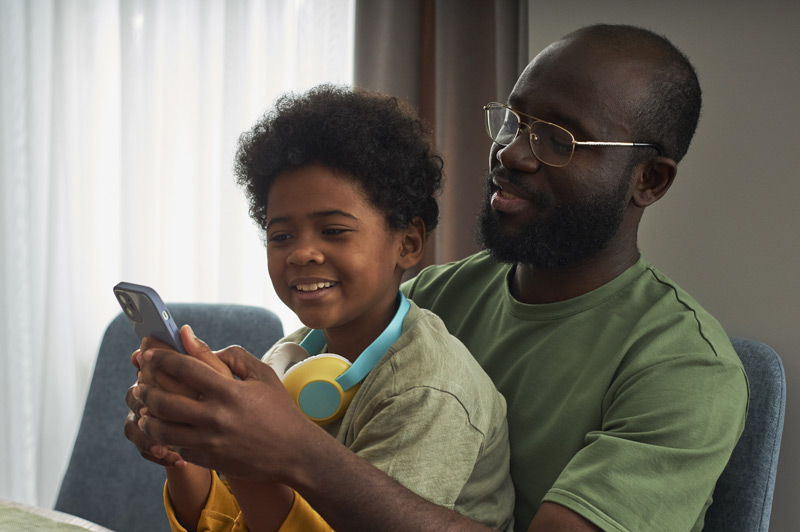
Parenting in the 21st Century: Navigating the Challenges of a Digital Age-Nse Etteh
Parenting in the 21st century presents a unique set of challenges that previous generations never had to face. With the advent of technology, the internet, and online gaming, today’s parents are tasked with raising children in a world that is vastly different from the one they grew up in. As a parent myself, with children aged 12 and 8, I often find myself struggling to strike a balance between my own upbringing and that of my kids.
One of the biggest challenges of parenting in the digital age is the constant presence of screens and technology in our lives. While technology can be incredibly beneficial in terms of education and communication, it can also be a source of distraction and dependence for children. Finding the right balance between allowing our children to benefit from technology and ensuring that they are not overwhelmed by it can be a daunting task.
Another issue that many modern parents face is the pressure to provide their children with the latest gadgets and toys. In today’s consumer-driven society, it can be tempting to give in to the demands of our children and constantly strive to keep up with the latest trends. However, it is important to remember that material possessions do not equal happiness, and that true fulfillment comes from experiences and relationships, not things.
In addition to the challenges presented by technology and consumerism, modern parents must also contend with the pressures of raising children in a fast-paced, competitive world. From a young age, children are expected to excel academically, participate in numerous extracurricular activities, and maintain a busy social life. This can lead to feelings of stress and burnout for both parents and children alike.
So, how can we navigate these challenges and raise well-rounded, resilient children in the 21st century? One key strategy is to prioritize quality time spent together as a family. Instead of focusing on material possessions, make an effort to create lasting memories through shared experiences such as family outings, game nights, and meaningful conversations.
Additionally, it is important to set boundaries around screen time and technology usage. Encourage your children to engage in offline activities such as sports, arts and crafts, and outdoor play. Limiting screen time can help children develop important social skills and reduce feelings of isolation and dependence on technology.
Lastly, remember to practice self-care and prioritize your own well-being as a parent. In order to provide the best possible support for your children, you must first take care of yourself. Make time for activities that bring you joy and relaxation, and don’t be afraid to ask for help when you need it.
In conclusion, parenting in the 21st century is no easy task, but with mindfulness, intentionality, and a strong support system, it is possible to raise happy, healthy children in a digital age. By prioritizing quality time, setting boundaries around technology usage, and practicing self-care, we can navigate the challenges of modern parenting and ensure that our children grow up to be resilient, compassionate individuals.
One of the biggest challenges of parenting in the digital age is the constant presence of screens and technology in our lives. While technology can be incredibly beneficial in terms of education and communication, it can also be a source of distraction and dependence for children. Finding the right balance between allowing our children to benefit from technology and ensuring that they are not overwhelmed by it can be a daunting task.
Another issue that many modern parents face is the pressure to provide their children with the latest gadgets and toys. In today’s consumer-driven society, it can be tempting to give in to the demands of our children and constantly strive to keep up with the latest trends. However, it is important to remember that material possessions do not equal happiness, and that true fulfillment comes from experiences and relationships, not things.
In addition to the challenges presented by technology and consumerism, modern parents must also contend with the pressures of raising children in a fast-paced, competitive world. From a young age, children are expected to excel academically, participate in numerous extracurricular activities, and maintain a busy social life. This can lead to feelings of stress and burnout for both parents and children alike.
So, how can we navigate these challenges and raise well-rounded, resilient children in the 21st century? One key strategy is to prioritize quality time spent together as a family. Instead of focusing on material possessions, make an effort to create lasting memories through shared experiences such as family outings, game nights, and meaningful conversations.
Additionally, it is important to set boundaries around screen time and technology usage. Encourage your children to engage in offline activities such as sports, arts and crafts, and outdoor play. Limiting screen time can help children develop important social skills and reduce feelings of isolation and dependence on technology.
Lastly, remember to practice self-care and prioritize your own well-being as a parent. In order to provide the best possible support for your children, you must first take care of yourself. Make time for activities that bring you joy and relaxation, and don’t be afraid to ask for help when you need it.
In conclusion, parenting in the 21st century is no easy task, but with mindfulness, intentionality, and a strong support system, it is possible to raise happy, healthy children in a digital age. By prioritizing quality time, setting boundaries around technology usage, and practicing self-care, we can navigate the challenges of modern parenting and ensure that our children grow up to be resilient, compassionate individuals.



